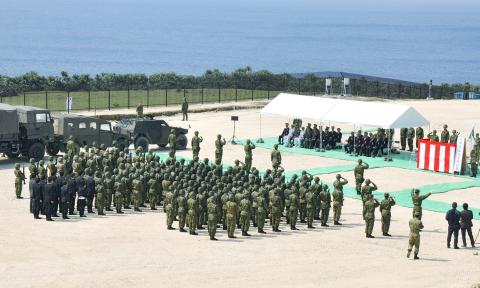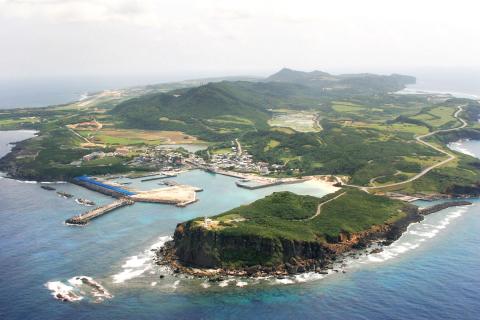Japan yesterday switched on a radar station in the East China Sea, giving it a permanent intelligence-gathering post close to Taiwan and a group of islands disputed by Japan and China, drawing an angry response from Beijing.
The new Japan Self-Defense Forces base on Yonaguni Island is at the western extreme of a string of Japanese islands in the East China Sea, 150km south of the Diaoyutai Islands (釣魚台) — known as the Senkakus in Japan. The Diaoyutais are claimed by Taiwan, China and Japan.
China has raised concerns with its neighbors and in the West with its assertive claim to most of the South China Sea where Taiwan, Philippines, Vietnam, Malaysia and Brunei have overlapping claims. Japan has long been mired in a territorial dispute with China over the East China Sea islands.

Photo: Reuters / Kyodo / Files
“Until yesterday, there was no coastal observation unit west of the main Okinawa island. It was a vacuum we needed to fill,” said Daigo Shiomitsu, a Ground Self-Defense Forces lieutenant colonel who commands the new base on Yonaguni. “It means we can keep watch on territory surrounding Japan and respond to all situations.”
Shiomitsu yesterday attended a ceremony at the base with 160 military personnel and about 50 dignitaries. Construction of some buildings, which feature white walls and traditional Okinawan red-tiled roofs, is still unfinished.
The 30km2 island is home to about 1,500 people, who mostly raise cattle and grow sugar cane. The Self-Defense Forces contingent and family members are to increase the population by 20 percent.

Photo: Reuters / Kyodo / Files
“This radar station is going to irritate China,” Nihon University professor and retired major general Nozomu Yoshitomi said.
In addition to being a listening post, the facility could be used as a base for military operations in the region, he added.
In a statement, the Chinese Ministry of National Defense said the international community needed to be on high alert to Japan’s military expansion.
“The Diaoyu Islands are China’s inherent territory. We are resolutely opposed to any provocative behavior by Japan aimed at Chinese territory,” it said. “The activities of Chinese ships and aircraft in the relevant waters and airspace are completely appropriate and legal.”
The listening post fits into a wider military buildup along the island chain, which stretches 1,400km from the Japanese home islands.
Policymakers last year told reporters it was part of a strategy to keep China at bay in the Western Pacific as Beijing gains control of the South China Sea.
Yonaguni is only about 100km east of Taiwan, near the edge of a controversial air defense identification zone established by China in 2013.
Over the next five years, Japan is to increase its Self-Defense Forces in the East China Sea by about 20 percent to almost 10,000 personnel, including missile batteries that would help Japan draw a defensive curtain along the island chain.
Chinese ships sailing from their eastern seaboard must pass through this barrier to reach the Western Pacific, access to which Beijing needs both as a supply line to the rest of the world’s oceans and for naval power projection.

NATIONAL SECURITY THREAT: An official said that Guan Guan’s comments had gone beyond the threshold of free speech, as she advocated for the destruction of the ROC China-born media influencer Guan Guan’s (關關) residency permit has been revoked for repeatedly posting pro-China content that threatens national security, the National Immigration Agency said yesterday. Guan Guan has said many controversial things in her videos posted to Douyin (抖音), including “the red flag will soon be painted all over Taiwan” and “Taiwan is an inseparable part of China,” while expressing hope for expedited “reunification.” The agency received multiple reports alleging that Guan Guan had advocated for armed reunification last year. After investigating, the agency last month issued a notice requiring her to appear and account for her actions. Guan Guan appeared as required,

A strong cold air mass is expected to arrive tonight, bringing a change in weather and a drop in temperature, the Central Weather Administration (CWA) said. The coldest time would be early on Thursday morning, with temperatures in some areas dipping as low as 8°C, it said. Daytime highs yesterday were 22°C to 24°C in northern and eastern Taiwan, and about 25°C to 28°C in the central and southern regions, it said. However, nighttime lows would dip to about 15°C to 16°C in central and northern Taiwan as well as the northeast, and 17°C to 19°C elsewhere, it said. Tropical Storm Nokaen, currently

PAPERS, PLEASE: The gang exploited the high value of the passports, selling them at inflated prices to Chinese buyers, who would treat them as ‘invisibility cloaks’ The Yilan District Court has handed four members of a syndicate prison terms ranging from one year and two months to two years and two months for their involvement in a scheme to purchase Taiwanese passports and resell them abroad at a massive markup. A Chinese human smuggling syndicate purchased Taiwanese passports through local criminal networks, exploiting the passports’ visa-free travel privileges to turn a profit of more than 20 times the original price, the court said. Such criminal organizations enable people to impersonate Taiwanese when entering and exiting Taiwan and other countries, undermining social order and the credibility of the nation’s

‘SALAMI-SLICING’: Beijing’s ‘gray zone’ tactics around the Pratas Islands have been slowly intensifying, with the PLA testing Taiwan’s responses and limits, an expert said The Ministry of National Defense yesterday condemned an intrusion by a Chinese drone into the airspace of the Pratas Islands (Dongsha Islands, 東沙群島) as a serious disruption of regional peace. The ministry said it detected the Chinese surveillance and reconnaissance drone entering the southwestern parts of Taiwan’s air defense identification zone early yesterday, and it approached the Pratas Islands at 5:41am. The ministry said it immediately notified the garrison stationed in the area to enhance aerial surveillance and alert levels, and the drone was detected in the islands’ territorial airspace at 5:44am, maintaining an altitude outside the effective range of air-defense weaponry. Following